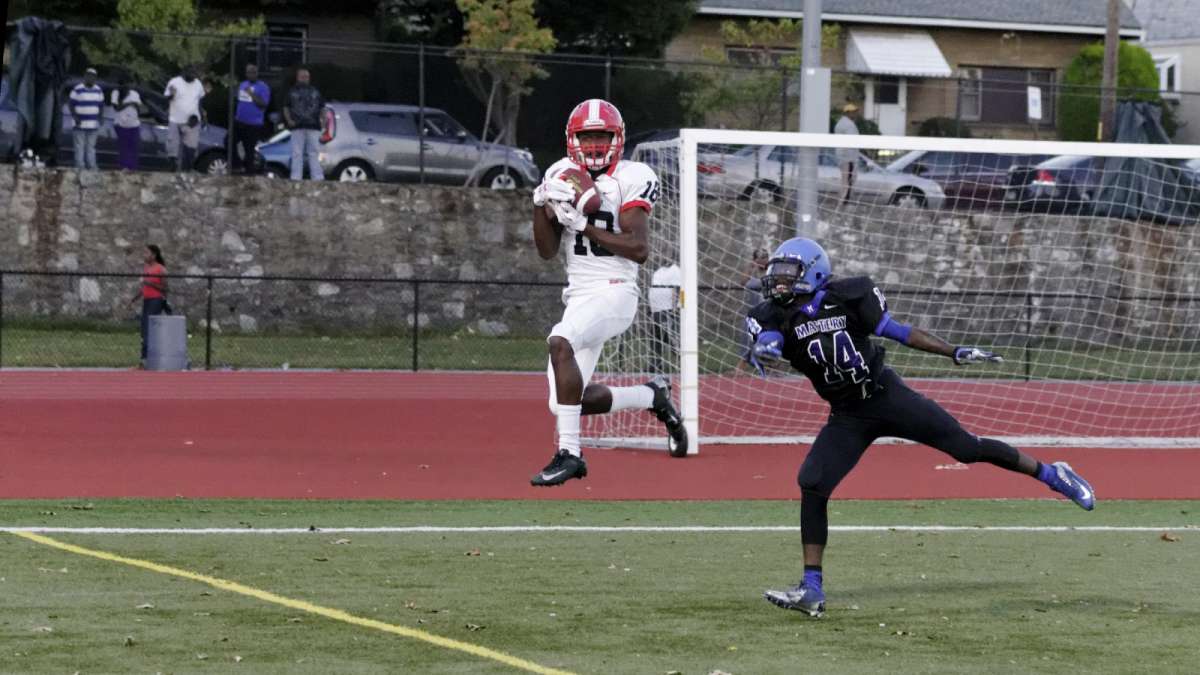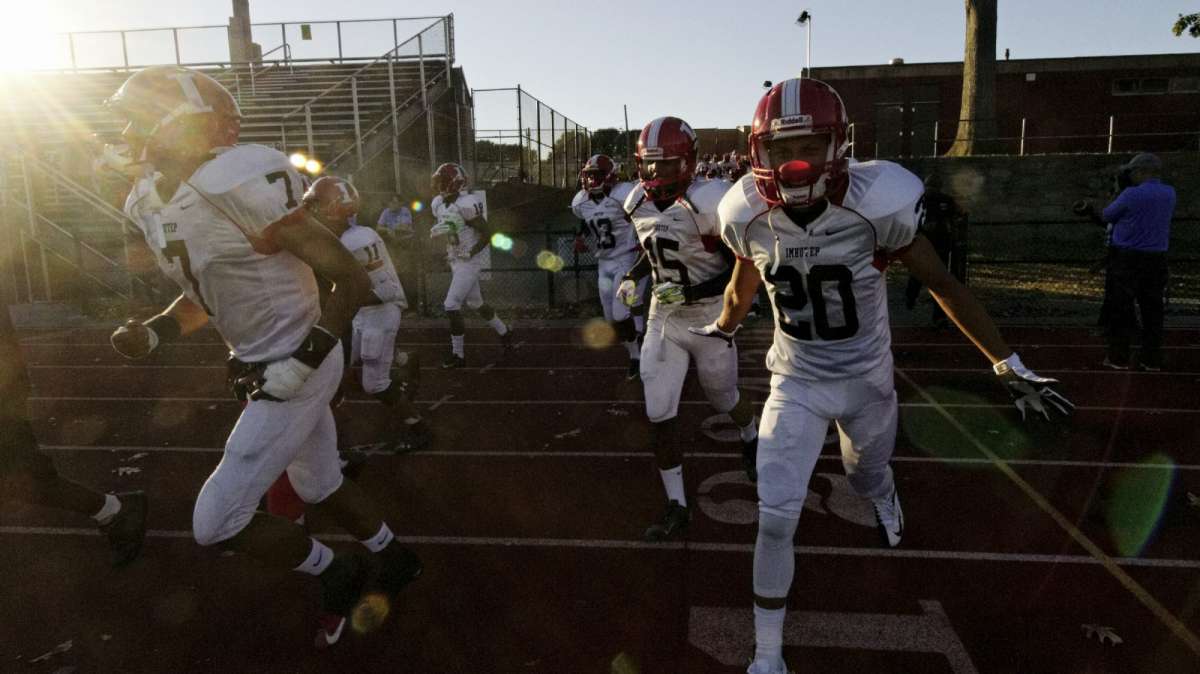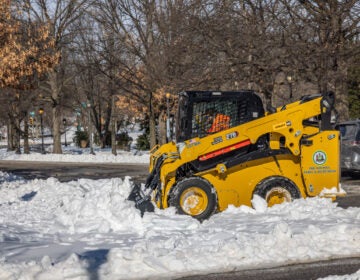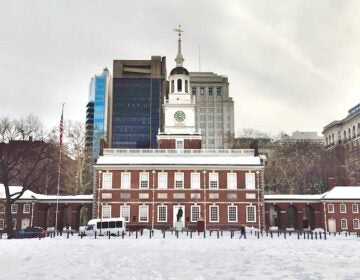Northwest Philadelphia cops chat with residents over cups of coffee
-

-

-

-

-

-

-

-

-

-

-

-

-

-

-

-

-

-

-

-

The Imhotep Panthers played for their third Public League football title this weekend. (Bas Slabbers/for NewsWorks)
-

-

-

An emerging national trend in community policing is brewing in Chestnut Hill.
Known as “Coffee with a Cop,” the event places police officers in local restaurants and coffee shops in order to foster stronger relationships between communities and those that patrol the streets.
Earlier this month, officers from the Philadelphia Police Department’s 14th District parked their patrol cars and placed their orders at the Market at the Fareway in Chestnut Hill.
Officer Robert Mahan and Sgt. Nicholas Tees were there to field questions and offer safety tips to numerous community members who wandered into the market one recent Friday morning.
“The goal is to inform residents about crime prevention,” said Mahan, 41, who has spent his decade-long police career in various sections of the 14th District, which stretches from Chestnut Hill to Southwest Germantown.
‘Don’t feel that you’re bothering us’
In addition to fielding specific questions on Friday, Mahan touted the advantages of modern surveillance systems and burglary alarms.
As violent crime is virtually non-existent in Chestnut Hill, cops who push their patrol cars through the streets of the ‘Hill are primarily concerned with property crimes, chief among them being residential burglaries.
For decades, Chestnut Hill was a target for thieves.
In a non-fiction tome entitled “Confessions of a Second Story Man,” burglars from the infamous Philly-based K & A Gang boasted that they had been inside of every home in the neighborhood.
However, due to proactive policing and concerted community engagement, police have begun to turn the tide on the break-ins.
In 2013, police reported an approximately 60 percent drop in residential burglaries in Chestnut Hill.
As of Sept. 14, Chestnut Hill and surrounding neighborhoods experienced 30 residential burglaries in 2014, down from 79 at the same date in 2013.
While the statistics are encouraging, Mahan observed that residents play a role in safeguarding their community, and asked them to call 911 at the sight of suspicious activity.
“Don’t feel that you’re bothering us,” he said on Friday, recognizing that some residents are reluctant to call the police in response to seemingly trivial concerns.
Areas of interest
As part of specialized patrols established by Capt. John Fleming, commanding officer of the 14th District, Mahan and fellow officers are keeping a close eye on the Chestnut Hill Business District and surrounding neighborhoods.
Beyond maintaining visible police presence in one of the farthest corners of the city, Mahan’s job is to get out of the patrol car and interact with residents and business owners.
In fact, it was on one such trip to the Market that the idea for “Coffee with a Cop” was born.
Mahan credited an employee of Poppy’s Coffee with mentioning a similar undertaking overseen by the Montgomery Township Police Department (MTPD).
Officer James Matlack, the MTPD’s community relations officer, said his agency began “Coffee with a Cop” in February after learning about it from members of the Abington Police Department.
“I thought it was a little strange, but I looked into it,” Matlack said.
The inaugural event drew a respectable turnout, but a second event held at a Starbucks in Montgomeryville cemented the potential for the program in his mind.
“It was 10 times better than expected. The response was off the chart,” he said, noting that officers stayed an hour later than expected due to interest from the public.
Beyond the conversation, the event featured the department’s K-9 unit and served as a fundraiser for the acquisition of bulletproof vests.
There were other benefits as well.
“The information we got was unbelievable,” he said, noting that one exchange resulted in the shuttering of a significant drug operation that operated inconspicuously in a residential side street.
Matlack said that “Coffee with a Cop” will definitely continue to be a part of MTPD community outreach efforts. He offered his endorsement should the PPD be interested in exploring it further.
“I think it’s something they should jump on,” Matlack said. “They have the manpower; they have the locations.”
Roots of a national idea
While informal iterations of “Coffee with a Cop” have probably taken place since the advent of the modern policing, the contemporary, branded program can be traced to a law enforcement agency in southern California.
“I wish they would have called us,” laughed Sgt. Chris Cognac of the Hawthorne (Cal.) Police Department (HPD) when told that the PPD had undertaken an unofficial, trial version.
Unlike community meetings sponsored by police agencies, branded “Coffee with a Cop” events have a simple script: No agendas and no speeches. As a result, residents come in to discuss neighborhood problems and police procedures. Some come just to chat.
“Too many times, police officers approach meetings like briefings, where officers talk to [residents],” Cognac said. “We try to talk with them. You can talk with the guy who works on your streets.”
With encouragement from HPD Chief Robert Fager to explore stronger community outreach programs, Cognac and other HPD members unveiled “Coffee with a Cop” in March 2011 at a McDonald’s.
After gaining local traction, word of the event spread quickly.
An initiative expands
Currently, “Coffee with a Cop” boasts a strong web presence and has been adopted by hundreds of police departments at thousands of events in 46 states and in Canada, Africa and Australia.
Cognac is reluctant to take credit for the original concept, but the HPD can lay some claim to the program’s expansion.
In partnership with the University of Illinois, Coffee with a Cop received a $399,000 grant from the Department of Justice’s Community Oriented Policing Services.
The grant enabled Cognac and others to develop a five-hour curriculum for the event and to travel across the country to teach law enforcement agencies about the program.
A major component is what Cognac calls the “red dot/green dot theory,” in which green represents a positive interaction with the public and red represents a negative one.
“We teach that it takes 15 green dots to erase one red dot,” he said.
Referencing the recent troubles in Ferguson, Mo., Cognac said that “Coffee with a Cop” events can have a meaningful impact on communities as well as on police officers, who may not have opportunities to interact with the law-abiding public.
“It’s the most important project in law enforcement currently,” he said. “It heals.”
Larger departments embracing the idea
A quick scan of the 700-plus pages of registered “Coffee with a Cop” events reveals that the program has been more widely embraced by smaller departments, a data point that Cognac attributes to the larger chain of command inherent in big city agencies.
But a tipping point appears to have been reached. Major departments in Boston, Dallas, Los Angeles, Omaha and Salt Lake City have adopted the program.
Locally, the PPD already has in place several community outreach programs.
Across the city, the commanding officers in the city’s 21 patrol districts host monthly town hall-style events, typically at the district’s headquarters.
In addition, each district is divided into three or four sectors known as Police Service Areas, each of which hosts its own monthly meeting managed by a district lieutenant at a neighborhood location.
However, all of the above are evening events with varying degrees of structure.
At the local level, Fleming was not opposed to the possibility of a future kaffeeklatsch with his officers, explaining that Chestnut Hill serves as a “good incubator” for the program.
“We’re watching it from its infancy,” he said. “We’ll let people talk and see if it’s helpful. If not, there’s no harm in trying. We can’t lose either way.”
Reaction in Chestnut Hill
Whether the PPD ultimately adopts “Coffee with a Cop” across the city, community members in Chestnut Hill were pleased with the earnest attempt at outreach.
Martha Sharkey, executive director of the Chestnut Hill Business Association, said that police have demonstrated a “real investment” in the business community.
“It’s another great way of helping to connect the police with the community,” said Sharkey. “They’re open to listening to our concerns.”
Chestnut Hill resident Sue Hankin expressed her appreciation for the efforts of local police.
“I think just the fact that they’re having this is very positive,” Hankin said. “It’s a good feeling to live in a place where the police are accessible and friendly and serious about taking care of us.”
WHYY is your source for fact-based, in-depth journalism and information. As a nonprofit organization, we rely on financial support from readers like you. Please give today.




